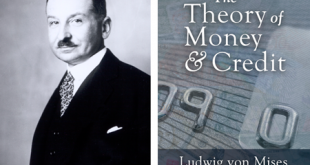In an attempt to maintain the lockdown and their authority over our lives, politicians, health experts, and the mainstream media have been misusing some unusual analogies to describe the current economy. By using these analogies, our political overlords hope they can continue to keep the economy shut down, force companies to produce what the government forgot to purchase before the virus hit, and toss out trillions of dollars of handouts and bailouts to their...
Read More »Defining “Inflation” Correctly
Inflation is typically defined as a general increase in the prices of goods and services—described by changes in the Consumer Price Index (CPI) or other price indexes. If inflation is a general rise in measured prices, then why is it regarded as bad news? What kind of damage can it inflict? Mainstream economists maintain that inflation causes speculative buying, which generates waste. Inflation, it is maintained, also erodes the real incomes of pensioners and...
Read More »Why Congressional “Oversight” of the Bureaucracy Is No Such Thing
How We Might Respond to a Panedemic Were Society Not So Dominated by the State
“There are no libertarians in an epidemic” crowed Atlantic reporter Peter Nicholas back on March 10, as he listed the numerous economic interventions the Trump administration was undertaking in the wake of the mounting COVID-19 crisis. This intervention, Nicholas declared, just goes to show you that whatever antigovernment talk one might talk, government intervention in the economy is “nothing new and, as may well prove the case this time around, it’s often...
Read More »The Chicago School versus the Austrian School
Listen to the Audio Mises Wire version of this article. People often ask me, “How are the Austrians different from the Chicago School economists? Aren’t you all free market guys who oppose big-government Keynesians?” In the present article I’ll outline some of the main differences. Although it’s true that Austrians agree with Chicago economists on many policy issues, nevertheless their approach to economic science can be quite different. It’s important to...
Read More »The Folly of “Ask What You Can Do for Your Country”
Recently, I was reminded of John F. Kennedy’s most famous line, “Ask not what your country can do for you; ask what you can do for your country,” when I heard it among several famous sound bites leading into a radio show segment. It also reminded me that we will hear it more soon, as we are approaching JFK’s May 29 birthday. However, it is worth reconsidering what it means. Of particular importance is Milton Friedman’s response that “Ask not” was “at odds with the...
Read More »Narrative Economics: How Stories Go Viral and Drive Major Economic Events
Narrative Economics: How Stories Go Viral and Drive Major Economic EventsRobert J. Shiller Princeton: Princeton University Press, 2019xxi + 377 pp. Abstract: Much of Shiller’s new book is about how economic narratives form, spread, and fade. Drawing on medical evidence about the spread of infectious disease, Shiller argues that “economic fluctuations are substantially driven by contagion of oversimplified and easily transmitted variants of economic narratives.” But...
Read More »The Japanese Love of Keynesian Economics Might Finally Be Coming to an End
Even those fortunate enough to have escaped infection by the Wuhan coronavirus will by now have noticed one of the virus’ many secondary effects: the disruption of the supply chain. Sick workers at meat plants, closed restaurants, hoarding, and the sudden spike in demand for things like ventilators, masks, and comestibles with long shelf lives have thrown the global flow of goods and services into disarray. Shelves are empty, crops are rotting in the fields—supply...
Read More »Why an Economy Can’t Work without Market Prices
It has been a full century since Mises dropped the economic calculation bomb, but the argument apparently still haunts socialists. It should, since Mises managed to show that a socialist economy is not an economy at all but calculational chaos. Yet it is curious that it does, since most have (incorrectly) concluded that Mises’s argument, after decades of debate, was debunked. Why does a presumably debunked argument still, drive even non-Austrian critics to pen new...
Read More »Banking and Monetary Policy from the Perspective of Austrian Economics
The editors are to be heartily congratulated for putting together this book, which covers an impressive range of topics in monetary economics from an explicitly Austrian perspective. Most of the twelve essays are of a very high quality and one will learn much about money and related topics by a careful reading of them. The chapters range from an insightful interpretation of Austrian monetary theory as a rehabilitation and development of classical monetary theory to...
Read More » Swiss Economicblogs.org
Swiss Economicblogs.org






